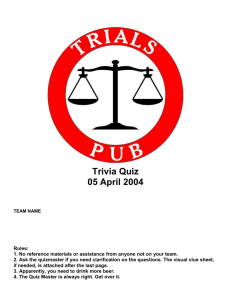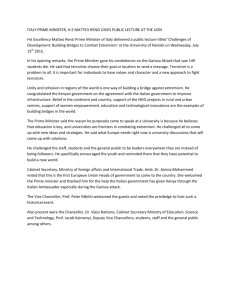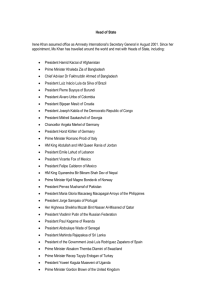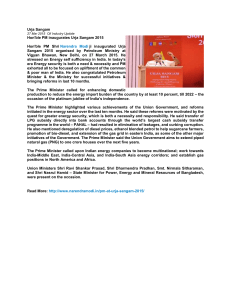(c) crown copyright Catalogue Reference:CAB/23/95 Image Reference:0011
advertisement
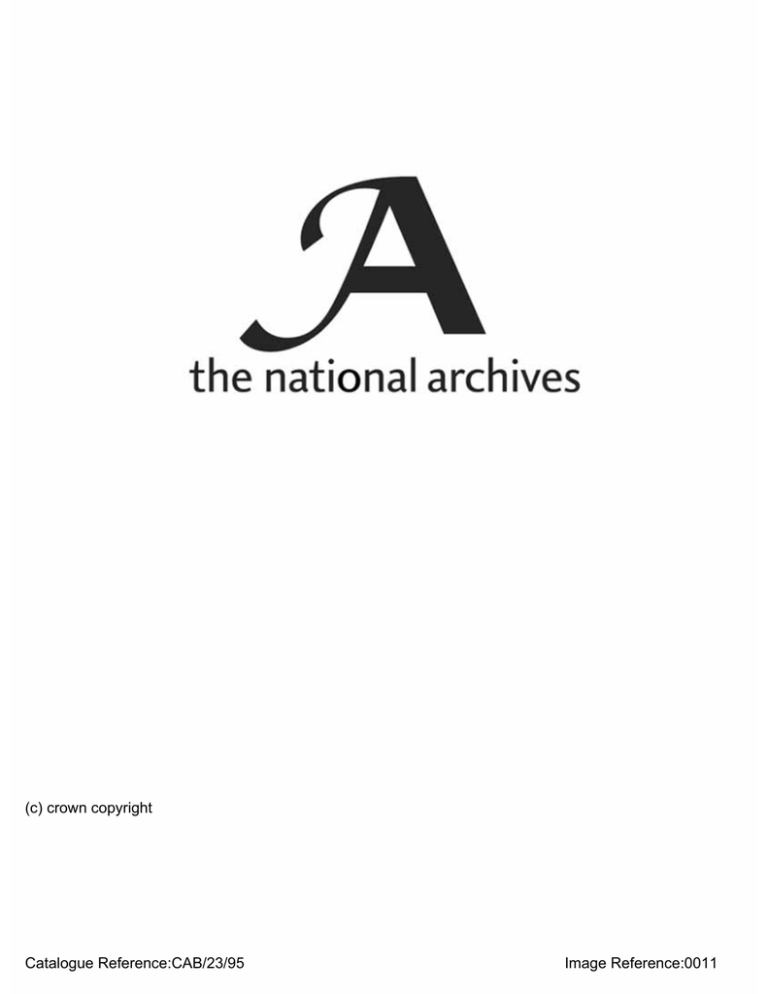
(c) crown copyright Catalogue Reference:CAB/23/95 Image Reference:0011 COPY ITO. G A B I N E T 47 (38). CONCLUSIONS of a Meeting of the Cabinet held at 10, Downing Street, 8.W.I., on jr/iday, 30th September, 1938, at 7.30 p.m. ! PRE S E N T:- The Right Hon. Neville Chamberlain, M.P., (in the Chair). Prime Ministero The Right Hon. The Right Hon. The Viscount Hailsham, Sir John Simon, G.C.3.T., Lord President of the Council. G.C.V.G. , O.B.E. , K.C. ,' M.P. , Chancellor of the Exchequer. The Right Hon. Lord Maugham, Lord Chancellor. The Right Hon. Sir Samuel Hoare,Bt., G.C.3.I., G.B.E., G.M.G., M.P., Secretary of State for Home Affairs. The Right Hon. The Viscount Halifax, K.G.. , G.C.3.I., G.C.I.E., Secretary of State for Foreign Affairs. The Right Hon. The Earl De La Warr,. Lord Privy Seal. The Most Hon. The Marquess of Zetland, G.C.S.I., G.C.I.E., Secretary of State for India. The Right Hon. Malcolm MacDonald, M.P., Secretary of State for the Colonies. The Right Hon. The Right Hon. Sir Thomas Inskip, G.B.E.. , K..C. , A. Duff Cooper, D.S.O., M.P., M.P., Minister for Co-ordination Firsts Lord of the Admiralty. of Defence. The Right Hon. L. Hore-Belisha, M..P. , Secretary of State for .^ar. The Right Hon. Sir Kingsley Wood, M*P., Secretary of State for Air. The Right Hon. The Right Hon. John Colville, McP., Oliver Stanley, M. C. , M.P. Secretary of State for Scotland. President of the Board of Trade. The Right Hon. The Right Hon. The Earl Stanhope, K.G.,D.S.O., W. S. Morrison, M.-C. ,K. 0. ,M..P., Minister of Agriculture and M.C., President of the Board of/ Education. Fisheries. The Right Hon. Walter Elliot, M.C., M.P., Minister of Healths The Right Hon. Ernest Brown, M.C., -M.P., Minister of Labour. The Right The Right.Hon. The Earl Winterton, M.P., Chancellor of the Duchy of Lancaster. Hon. E.L. Burgin, M.P., Minister of Transport. Mr. E.E. Bridges', M . C , ....... Secretary. THE MUNICH CONFERENCE. THE CHANCELLOR OP THE EXCHEQUER said that he thought the present occasion justified a departure prime Minister's from the normal procedure at Cabinet Meetings, and Report, that, before the Prime Minister spoke, he should express, on behalf of the whole Cabinet, their (previous Reference? profound admiration for the unparalleled efforts Cabinet 46(38).) the Prime Minister had made and for the success that he fTR V ? ^ ) ' . ha( * a c h i e v e ( a - s He would also like to say how proud they were to be associated with the Prime Minister as his colleagues at this time. THE PRIME MINISTER said that he was deeply­ grateful for what the Chancellor of the Exchequer had said, and for the support and help which he had received from his colleagues throughout the crisis. He appreciated that the journeys he had undertaken might easily haVe failed to achieve satisfactory results. As things had turned out, he felt that we could now safely regard the crisis as ended. He thought that it was right that his colleagues should meet at once and hear the results of the Conference at Munich. The discussions had begun after lunch on Thursday and had continued, with occasional intervals, throughout the night until after 1 morning. a.rric on Friday The length of the proceedings was largely due to the inefficiency of the arrangements for the Conference made hy the Germans.. When the time had come to sign the final Agreements, it had been found that the inkpot into which Herr Hitler dipped-his pen was emptyi At the outset of the Conference the Prime Minister had suggested that a Czech representative should be sent for, but it had been represented that the matter was too urgent to permit of the delay, that this course would involve. The Prime Minister mentioned that Signer Mussolini had arranged for his reception in Rome on his return from the Conference to take place on Friday. This had fixed the latest hour at which Signor Mussolini could leave Munich. The Prime Minister said that he had done his best for Czechoslovakia in the absence of a Czech Government representative, and he thought that the arrangements secured could, taken as a whole, be regarded as satisfactory. The simplest method of explaining the arrangement­ was, he thought, to set out the. main differences between the Agreement signed at Munich and the plan put forward by Herr Hitler at Godesberg. First, the Godosberg Memorandum,though cast in the form of proposals, was in fact an ultimatum, with a time-limit of six days. The Munich Agreement, which had now been accepted by the Czechoslovak Government, reverted, though not in express terms, to the Anglo-French plan (which was referred to in the. preamble). The agreement laid down the conditions for the application - on the responsibility of the Four Powers and under international supervision ­ of the main principle of that plan. Second, under the Munich Agreement, the evacuation of the territory to be occupied by the German military forces and its occupation by those forces would be carried out in five clearly defined stages between 1st October and 10th October (Article 4 ) , instead of having to be completed in one operation by 1st October,. Third; the line up to which the German troops would enter into occupation was no longer the line drawn by Herr Hitler as laid down in the map attached to the Godesberg Memorandum, but was a line to be fixed by an International Commission on which both Germany and Czechoslovakia would be represented. (Article 4.) Fourth: under the Godesberg Memorandum, the areas on the Czech side of the Hitler line which were to be subjected to plebiscite were laid down by Germany in the map, while those on the German side of that line were left undefined. Under the Munich Agreement, all plebiscite areas would be defined by the International Commission (Article 5 ) . The "green areas", therefore, like the Hitler line itself, disappeared. The criterion which the International Commission was to apply was to be the "predominantly German character" of the areas concerned, the interpretation of which was left to the Commission. The Hitler line had taken in some areas which were certainly not of a "predominantly German character". Fifth: the Godesberg Memorandum provided for the occupation of plebiscite areas by German and Czech forces (as the case might be) up to the plebiscite, and for their evacuation by those forces during the plebiscite Under the Munich Agreement, the plebiscite areas were to be occupied at once by an international force. Sixth; the Munich Arrangement, by stating (Article 5 ) that the plebiscite was to be based on the conditions of the Saar plebiscite, indicated that the vote was to be taken by small administrative areas such as communes. The Godesberg Memorandum did not indicate on what kind of areas the vote would he based, and gave rise to fears on the Czech side that the possible insistence by Germany on large areas might work to the disadvantage of Czechoslovakia. Seventh: The Czech Government, while bound under the Munich Arrangement to carry out the evacuation of the territories without damaging "existing installations" (Article 2 ) , was not placed under the oppressive and humiliating conditions of the appendix to the Godesberg Memorandum, which even provided that no foodstuffs, goods, cattle or raw materials were to be removed. Under the Munich agreement, the conditions of evacuation (Article 3) were to be laid down in detail by the International Commission. Under the Godesberg Memorandum the detailed arrangements for the evacuation were to be settled between Germans and Czechs alone. Eighth: Unlike the Godesberg Memorandum, the Munich Agreement contained provisions in regard to (a) right of option (Article 7) and (b) facilitating transfer of population (Article 7). Ninth: The Prime Minister explained that provision was made in the Supplementary Declaration for all other questions in regard to transfer of territory not dealt with in the main Memorandum to come under the purview'of the International Commission. The reason why this provision had B E E N INSERTED I N A SUPPLEMENTARY AGREEMENT WAS THAT W H E N THE TIME CAME TO S I G N T H E M A I N A G R E E M E N T I T W A S FOUND THAT H E R R R I B B E N T R O P H A D E X C I S E D A P R O V I S I O N TO THIS EFFECT WHICH HAD B E E N DRAFTED. HERR RIBBENTROP H A D S A I D THAT T H E O M I S S I O N O F A C L A U S E TO T H I S E F F E C T W O U L D M A K E N O D I F F E R E N C E , AS T H E M A T T E R W O U L D I N A N Y C A S E B E D E A L T W I T H B Y THE I N T E R N A T I O N A L COMMISSION. T H E P R I M E M I N I S T E R H A D T A K E N T H E V I E W THAT T H E F U N C T I O N S O F THE INTERNATIONAL COMMISSION WOULD B E G O V E R N E D B Y T H E I R TERMS O F REFERENCE, AND THAT IT W A S N E C E S S A R Y TO H A V E I T S P E C I F I C A L L Y L A I D D O W N THAT W H I C H M I G H T A R I S E OUT O F T R A N S F E R O F TERRITORY QUESTIONS SHOULD B E C O N S I D E R E D A S C O M I N G W I T H I N THE TERMS OF R E F E R E N C E O F THE INTERNATIONAL COMMISSION. THE PRIME MINISTER HAD I T W E L L W O R T H W H I L E TO SECURE THIS FURTHER THOUGHT CLAUSE. A S REGARDS GUARANTEES, PROVISION WAS MADE I N A N A N N E X TO T H E M U N I C H A G R E E M E N T FOR A G U A R A N T E E O F CZECHOSLOVAKIA AGAINST UNPROVOKED AGGRESSION. THE G U A R A N T E E O F P R A N C E AND G R E A T B R I T A I N E N T E R E D I N T O O P E R A T I O N AT O N C E , W H I L E T H E G U A R A N T E E O F G E R M A N Y I T A L Y CAME I N T O O P E R A T I O N A F T E R THE H U N G A R I A N P O L I S H MINORITIES QUESTIONS H A D B E E N AND AND SETTLED. THIS QUESTION OF GUARANTEES HAD BEEN A D I F F I C U L T O N E TO D E A L W I T H . THE PRIME MINISTER SAID THAT H E H A D S T A T E D THAT H E C O U L D N O T DEAL W I T H I T W I T H O U T A N O P P O R T U N I T Y O F FURTHER C O N S U L T A T I O N W I T H H I S GOVERNMENT. S I G N O R M U S S O L I N I H A D W A N T E D TO SAY THAT THE P O L I S H A N D H U N G A R I A N M I N O R I T I E S S H O U L D B E S E T T L E D O N THE SAME PRINCIPLE, A S THOSE A P P L I E D TO THE S U D E T E N G E R M A N S QUESTIONS and within a period of one month; and that in the meantime Italy and Germany would guarantee Czechoslovakia. The Prime Minister said that this suggestion had ,not appealed to him. In the first place, the phrase in regard to the application of the same principles as those applied in the case of the Sudeten-Germans had seemed to him to he rather f^ar-reaching. ^gain, he v/as not certain in what terms he wanted Germany and Italy included in the guarantee. In the end an arrangement had been reached which involved no further commitments in regard to our guarantee than v/e had already agreed to. Finally, the Four Powers had signed a declaration that if the problems of the Polish and Hungarian minorities^ in Czechoslovakia v/ere not settled within three months by agreement between the respective Governments, another Four-Power Meeting would be held to consider themThe Prime Minister said that these v/ere the main points of difference between the Munich Agree­ memt and the Godesberg Memorandum. He thought, it­ could fairly be said that the Munich Agreement v/as a vast improvement, and that it represented an orderly v/ay of carrying out the Franco-British proposals. diplomacy He thought it v/as a triumph for that representatives of the Four Pov/ers concerned should have met and reached a peaceful settlement of the matter. A number of the Prime Minister's-collea^ueB then put questions to him in regard to detailed points arising out of the terms of the Munich Agreement. The Prime Minister undertook to circulate to the Cabinet a Memorandum setting out in detail the points of difference between the Munich Agreement and the Godesberg Memorandum as early as possible. The Prime Minister was then asked about the Memorandum which he and Herr Hitler had signed that morning, which he read out to his colleagues (copy is appended as an Annex to these Minutes). The Prime Minister added that he had had some further conversation that morning with Herr Hitler on the following subjects: limitation of armaments, the position in Spain, and South Eastern Europe. The question of Colonies had not been referred to in this discussion. The Prime Minister undertook that he would take an early opportunity of informing his colleagues of the upshot of this conversation, either by making a statement at an early meeting of the Cabinet, or by circulating a written record. THE FIRST LORD OF THE ADMIRALTY said that after the detailed explanation given by the Prime Minister, he recognised that the differences "between the Godesberg Memorandum and the Munich Agreement were much greater than he had previously recognised. Nevertheless, he thought that it was right that he should say that he still felt a considerable uneasiness in regard to the position. He was afraid that we might get into the position in which we were drawn into making further concessions to Herr Hitler. He agreed, however, with the view which was put forward by several of his colleagues that there had not been time to study the terms of the Munich Agreement in detail, and he said that he was prepared to defer a final statement of his position until there had been a further opportunity to consider the Agreement. He added, however, that he had come to the meeting prepared to resign, and that he still felt it was his duty to offer the Prime Minister his resignation. THE PRIME MINISTER said that he thought that matters arising out of the First Lord's statement should be discussed between him and the First Lord. THE SECRETARY OP STATE POR FOREIGN AFFAIRS said that he felt sure that the Cabinet would wish to associate themselves with what the Chancellor of the Exchequer had said in regard to the Prime Minister's achievement in making this Agreement. He thought it would be desirable that the Cabinet should have an opportunity to reflect on the many important questions which were raised as a result of the Prime Minister's visit to Munich, and that at a later date there should be an opportunity for further discussion on these matters. This course was agreed to. / THE MINISTER POR CO-ORDINATION OF DEFENCE eaid that a meeting of Ministers had been held that morning to consider what action should be taken to \ suspend or cancel measures taken to meet the emergency n The general conclusion reached had been to recommend a standstill order for the time being, but not an extension of the precautions already in force. The Minister for Co-ordination of Defence said that while the position had, he thought, been adequately dealt with for the time being by the meeting held that morning, it would clearly be necessary to reach further decisions in the near future. He proposed that a further meeting of the Ministers concerned should be held on Monday at 12 noon to consider detailed steps necessary in the light of any general guidance which the Prime Minister might give in regard to the matter when he had had time to consider the position generally. This course was agreed to. Richmond Terrace, S.W.I. 1st October, 1938. -A H N E X. Text of Joint Declaration signed by the Prime Minister and Herr Hitler at Munich on Friday, 30th September, 19 38. We, the German Fuehrer and Chancellor, and the British Prime Minister, have had a further meeting to-day, and are agreed in recognising that the question of AngloGerman relations is of the first importance for the two countries and for Europe, We regard the Agreement signed last night and the Anglo-German Naval Agreement as symbolic of the desire of our two peoples never to go to war with one another again. We are resolved that the method of consultation shall be the method adopted to deal with any other questions that may concern our two countries, and we are determined to continue our efforts to remove possible sources of difference, and thus to contribute to assure the peace of Europe.


